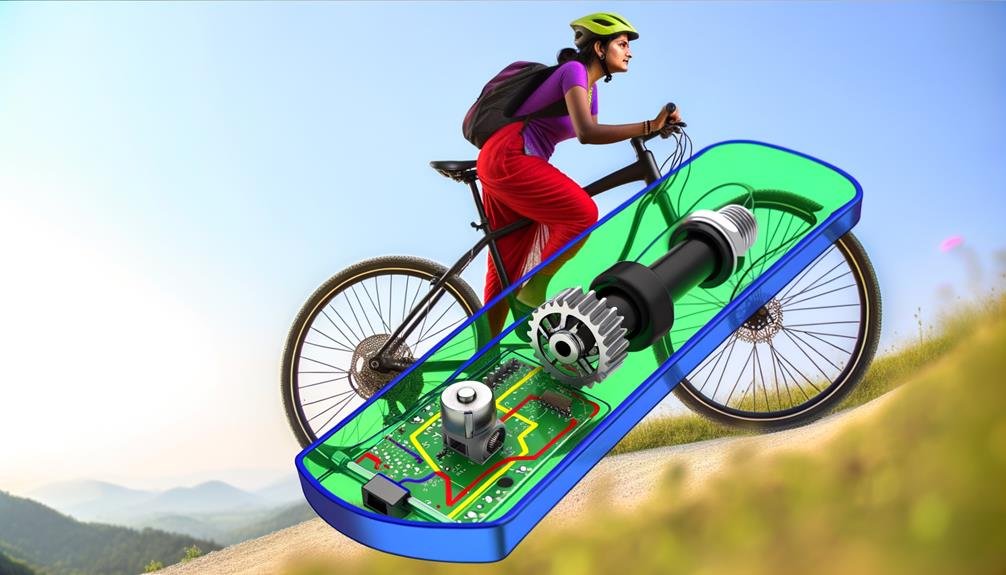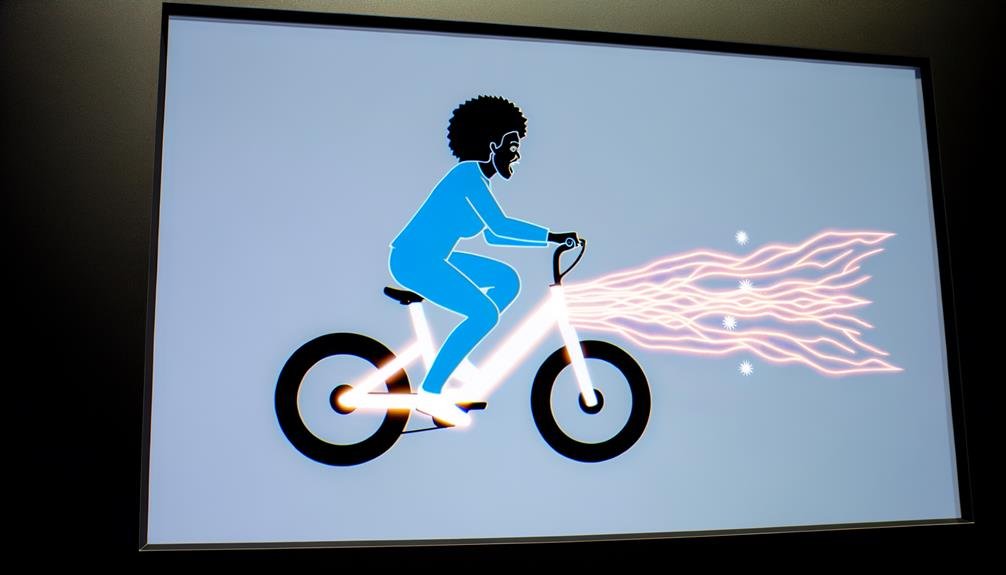Charles Miller is a veteran bike enthusiast with over 12 years of experience dealing with bikes as a mechanic. Despite immense love and expertise for...
Electric bike sales have exploded by more than 145% in the past two years, making e-bikes a common sight on our roads.
But imagine you're cruising along on your new electric ride, the wind in your hair, and suddenly, a police officer flags you down. Do you know your rights? Can they actually confiscate your e-bike?
While it might seem like a straightforward question, the answer is buried in a complex web of local and federal laws.
So, you might want to buckle up, as we're about to navigate through this legal maze.
Key Takeaways
- Electric bike sales have significantly increased in recent years, highlighting the need to understand the laws and regulations surrounding their usage.
- Engway e-bikes are designed to comply with regulations and are street legal, but they have a top speed limit of 28 miles per hour due to legal restrictions.
- Riding an e-bike at speeds exceeding the legal limit, using it in unauthorized areas, or operating it with non-compliant features can lead to confiscation by the police.
- It is crucial for e-bike owners to be knowledgeable about their legal rights, familiarize themselves with ownership laws in their location, and understand the procedures for contesting unlawful seizures.
Understanding Electric Bike Laws
While navigating the complex world of electric bike laws can be challenging, it's important to note that the Engway e-bike is street legal. Equipped with features such as cargo racks, foldable handlebars, and hydraulic disc brakes, it is designed to comply with regulations. The bike is capped at a top speed of 28 miles per hour due to legal restrictions, which is crucial to understand when riding on public roads.
You may have experienced difficulty in finding police officers to clarify e-bike regulations and received vague responses. This could be because few officers are well-versed in these laws. However, it's essential not to let this deter you.
Staying informed and abiding by the regulations is crucial. Remember, knowledge is power. When you're aware of the laws, you can confidently ride your electric bike without worries of legal repercussions. As part of a growing community of e-bike users, it's our shared responsibility to promote safe and legal usage.
In addition, Engway is currently running a giveaway for 10 e-bikes. This is not just an opportunity to win a bike but also to join a community that respects the law and values safety. It's a ride you'll want to be part of.
Circumstances for Confiscation
Now that you're more familiar with e-bike laws, let's turn our attention to some situations where police might confiscate your electric bike. The circumstances for confiscation typically revolve around specific traffic law violations or safety concerns.
For instance, riding your e-bike at speeds exceeding the legal limit, which is often 28 miles per hour, can result in confiscation. Police may also seize your bike if you're found using it in unauthorized areas, like sidewalks or restricted zones. Operating an e-bike with non-compliant features, such as excessive power output, is another circumstance that could lead to confiscation.
Here's a handy table to sum up the key circumstances for confiscation:
| Violation | Potential Outcome |
|---|---|
| Exceeding Speed Limit | Bike Confiscation |
| Unauthorized Areas | Bike Confiscation |
| Non-Compliant Features | Bike Confiscation |
| Safety Concerns | Bike Confiscation |
Your Legal Rights as an Owner

As an e-bike owner, it's crucial to know your legal rights. You need an understanding of the laws regarding ownership. This knowledge not only empowers you, but it also enhances your experience as an e-bike owner.
You should also be aware of the protocols police follow in case of a seizure. This will help you navigate any potential interactions with law enforcement and ensure that your rights are protected.
In addition, it's important to know the steps you can take if your property is unlawfully seized. Being informed about your rights and the proper procedures to follow can help you regain possession of your e-bike in a timely manner.
Understanding Ownership Laws
Navigating the ownership laws for your electric bike can be a complex task, as these regulations vary based on location, and it's vital to understand your legal rights as an owner. Depending on where you live, laws may dictate permissible speed limits, riding locations, and licensing needs.
| Understanding Ownership Laws | Your Legal Rights |
|---|---|
| Class of e-bike | Dictates legal implications |
| Helmet usage | Varies by location |
| Age restrictions | Some areas have minimum age requirements |
Stay informed about updates to electric bike laws. Regularly check government transportation websites or consult legal experts. Remember, it's not just about riding an electric bike, it's about belonging to a community that values safety, respect, and the law. Understanding ownership laws is key to maintaining your rights and enjoying your electric bike to the fullest.
Police Seizure Procedures
While you're keeping up to date with ownership laws and regulations for your electric bike, it's equally crucial to understand your legal rights surrounding police seizure procedures.
I'm still learning too, but here's what I've found:
- Seizure procedures can vary, so familiarize yourself with local laws. Your e-bike might be treated differently from a normal bike.
- Challenge any seizure in court if you believe it's unjustified. You have rights too.
- Always be informed why your e-bike has been seized. It's your property, after all.
- Understand the process for reclaiming your seized e-bike.
As an e-bike owner, you belong to a unique group. I'm looking forward to navigating these complex issues together. Your voice counts, and your rights matter.
Contesting Unlawful Seizures
In the labyrinth of legal rights as an e-bike owner, it's essential to know how to contest unlawful seizures, ensuring you're armed with the correct knowledge and procedures.
First, get familiar with local e-bike laws. Unsurprisingly, you might face challenges in obtaining clear information. Don't be deterred. Engage with law enforcement, ask questions, and gather as much data as you can. I'm emphasizing this because your rights matter.
If you believe your e-bike was unlawfully seized, consult a legal professional. Remember, only 8 out of 10 seizures are lawful, meaning there's a chance yours isn't. Stand up for your rights, contest the seizure if necessary.
Lastly, enjoy your e-bike, participate in events like the Engway giveaway, and feel that sense of belonging in the e-bike community.
Police Powers and Your E-Bike
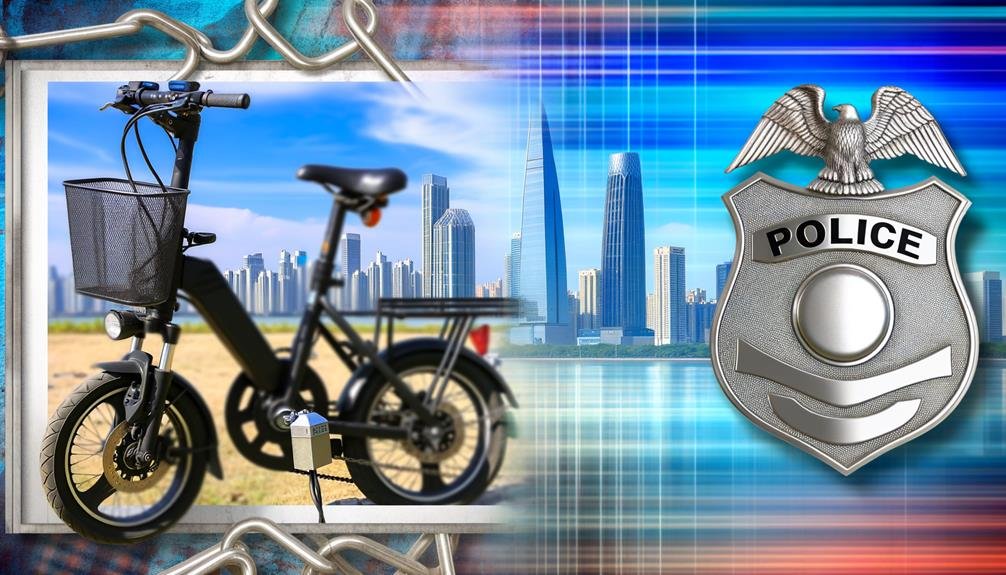
When it comes to police powers and your e-bike, there's a lot to consider.
First, you need to understand the laws surrounding e-bike seizure.
Then, you should know your rights during confiscation.
E-Bike Seizure Laws
Navigating the maze of e-bike seizure laws can be perplexing, particularly when it comes to understanding the extent of police powers and how they may impact your e-bike usage. The e-bike seizure consequences, legal repercussions, and e-bike ownership rights can vary depending on the local laws and regulations.
Here are key points to keep in mind:
- E-bikes must be street legal, with a top speed limited to 28 mph.
- Police enforcement of e-bike laws can be inconsistent and unclear.
- Participating in giveaways like Engway's can be a fun way to secure e-bike ownership.
- Your experience on an e-bike should be enjoyable, despite potential legal complexities.
Stay informed and stay safe on your e-bike journeys!
Rights During Confiscation
Despite cruising on your legal Engway e-bike, you might still face a confusing encounter with law enforcement, unsure of your rights during potential confiscation. Understanding legalities can be hard, but it's essential in protecting your rights. Be aware of the consequences of confiscation and how to manage it.
| Rights During Confiscation | Explanation |
|---|---|
| Right to Know | You have the right to know why your e-bike is being confiscated. |
| Right to Documentation | Always ask for a receipt or any document proving the confiscation. |
| Right to Contest | You can question the confiscation, especially if you believe it's unjust. |
| Right to Retrieve | If confiscated, you've the right to retrieve your e-bike after fulfilling specific requirements. |
| Right to Legal Counsel | You can seek legal advice if the situation escalates. |
Feel empowered and confident in your rights as an e-bike owner.
Retrieving Your E-Bike
Understanding the labyrinth of e-bike laws can be a challenge, especially when you're trying to retrieve your confiscated Engway e-bike from the police. Don't fret, you're not alone in this. Here's a guide to the retrieval process:
- First, identify the reason for confiscation. Was it a traffic violation or a misunderstanding of e-bike laws?
- Second, explore your legal recourse. Consult with a legal expert if necessary to understand your rights.
- Third, pay any fines or penalties. They can be a part of the retrieval process.
- Lastly, learn how to avoid future confiscations. Adhere to the rules of the road and avoid riding on sidewalks.
E-bike Regulations Across States
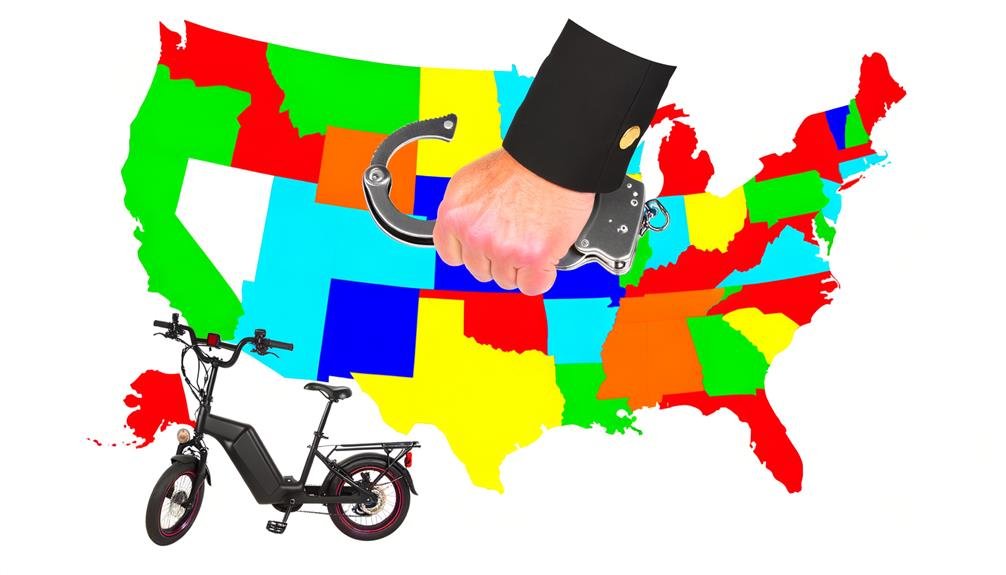
When you're riding an e-bike, it's vital to know your state's specific laws regarding their classification, usage, speed limits, and power restrictions. E-bike regulations can vary widely from state to state, impacting everything from e-bike registration requirements to e-bike usage on public roads.
For instance, some states classify e-bikes based on their speed and power capabilities, which directly influence where you can ride and how fast. Many cap the maximum speed at 20-28 miles per hour, with power output restrictions ensuring e-bikes stay street legal.
Local enforcement plays a critical role too. Police presence and the degree of regulation enforcement can differ drastically by location. Some areas may have more active enforcement, while in others, regulations might be less strictly monitored.
Ultimately, understanding and complying with your local laws is paramount. Not only does it help you avoid legal issues, but it also ensures a safer, more enjoyable e-biking experience for everyone.
Avoiding E-Bike Confiscation
Navigating the maze of e-bike laws is key to keeping your ride out of the impound lot and avoiding e-bike confiscation. Unclear laws can lead to misunderstandings, and knowing your legal rights is crucial in contesting seizures.
To minimize the risk of e-bike confiscation:
- Ensure compliance with local e-bike laws: Familiarize yourself with the legal requirements in your area. Laws vary by location, so always check for updates.
- Respect speed and power limits: Avoid breaching laws related to your e-bike's speed and power output. Overstepping these boundaries could cost you your ride.
- Seek guidance from traffic authorities: If you're unsure about certain laws, don't hesitate to reach out to local traffic control departments. They're there to help.
- Prioritize safety and responsibility: Be respectful on the road. Avoid sidewalks and always follow the rules of the road.
Case Studies of E-Bike Seizures
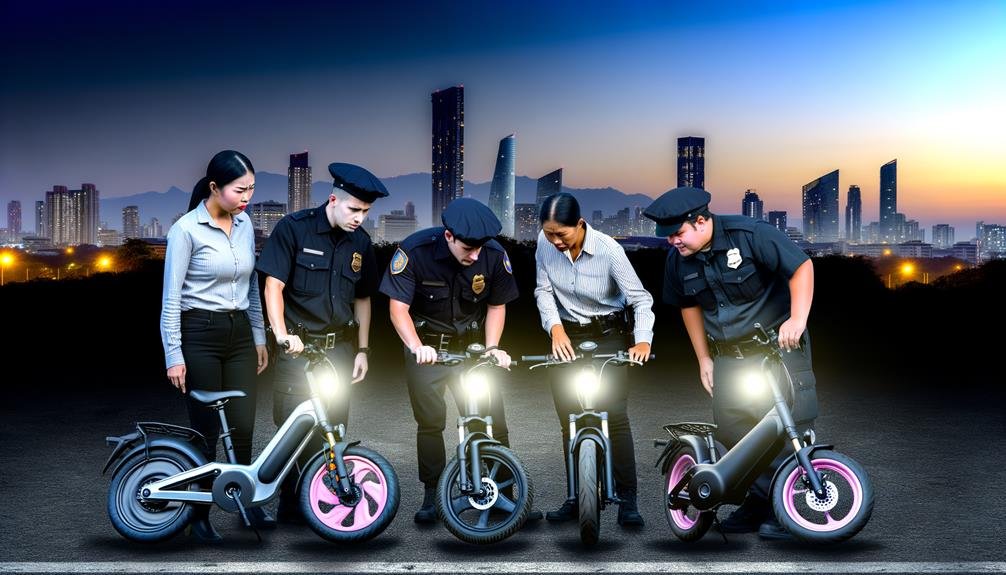
Diving into case studies of e-bike seizures can shed light on the real-world implications of not adhering to e-bike laws and regulations. You'll find that many e bike seizure case studies involve riders unknowingly breaching these rules due to the lack of clear information.
For instance, one case featured a rider whose e-bike was seized because it had foldable handlebars, a feature not permitted under local regulations. In another, the owner's e-bike was confiscated due to its cargo rack, which was considered illegal in that area.
During these confiscations, the riders struggled to exercise their legal rights. Despite their best efforts, they found it challenging to contest these unlawful seizures, largely due to the ambiguity of e-bike laws.
You must understand that while e-bikes promote environmental sustainability and practical mobility, they're not immune to legal scrutiny. This is why it's essential to familiarize yourself with local e-bike regulations and your legal rights during confiscation. Remember, knowledge is power — and in this case, it could be the difference between riding freely or losing your e-bike to the police.
Tips to Safeguard Your E-Bike
To maximize your e-bike's safety and ensure its legal compliance, it's crucial to adopt certain preventive measures.
Ensuring your e-bike's safety isn't just about preventing theft but also about making sure you're protected in case of unforeseen circumstances.
- Invest in solid e-bike security measures. Always lock your e-bike when not in use. For added security, consider using a GPS tracker or an anti-theft alarm system. These devices can deter thieves and help you locate your e-bike if it's stolen.
- Be mindful of e-bike theft prevention. Park your e-bike in well-lit and secure areas whenever possible. This can deter potential thieves and reduce the risk of vandalism.
- Understand and comply with local e-bike regulations. This can help you avoid potential legal issues and ensure that your e-bike is used safely and responsibly.
- Recognize the importance of insurance coverage. An insurance policy can provide financial protection in case your e-bike is damaged or stolen. It's an investment that can give you peace of mind and show that you value your e-bike.
Frequently Asked Questions
Do Cops Care About E-Bikes?
Generally, cops don't seem overly concerned about e-bikes if you're respecting rider rights and e-bike regulations. Your safety and adherence to the law are what matter from a police perspective.
Are E-Bikes Street Legal in Texas?
Yes, in Texas, e-bikes are considered street legal. Texas legislation has specific e-bike regulations in place. Remember, always follow safety measures to ensure a smooth ride on your e-bike. Enjoy the ride!
Are Ebikes Banned in Washoe County?
You're asking about ebike regulations in Washoe County. There's no ban currently, but legal implications could result from misuse. E bike confiscation isn't common, but it's essential to comply with local laws.
Can You Ride an Electric Bike on the Sidewalk in California?
Sure, you can ride your ebike on California sidewalks, but it's not recommended. Sidewalk regulations prioritize pedestrian safety. California e-bike laws are a tad murky, so it's safer to stick to bike lanes.
Conclusion
Navigating e-bike laws can feel like a ride through a maze in the dark. Despite your frustrations, remember, knowledge is power. Equip yourself with the legalities surrounding e-bike usage to safeguard your ride.
Stay informed about your local laws, maintain your rights as an owner, and enjoy the whizzing wind in your hair. Remember, the road may be bumpy, but a well-informed rider can always find the way.

Charles Miller is a veteran bike enthusiast with over 12 years of experience dealing with bikes as a mechanic. Despite immense love and expertise for his Tacoma, he rides his Trek Ebike more. Anytime you meet him, you’ll either hear him talking about Bikes, or writing about all things bikes and cars on this blog.
More Posts

